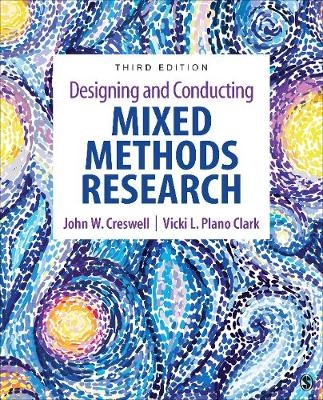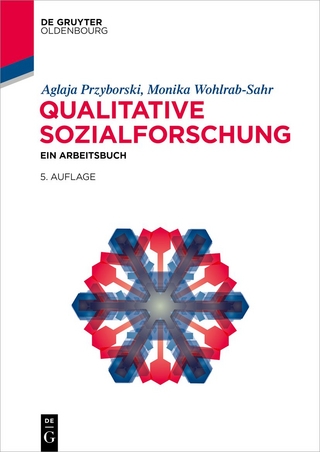
Designing and Conducting Mixed Methods Research
SAGE Publications Inc (Verlag)
978-1-4833-4437-9 (ISBN)
- Titel wird leider nicht erscheinen
- Artikel merken
John W. Creswell, PhD, has been a professor of educational psychology at the University of Nebraska-Lincoln since 1978. In addition to teaching at the university, he has authored numerous articles on mixed methods research, qualitative methodology, and general research design and 12 books, many of which focus on types of research designs, comparisons of different qualitative methodologies, and the nature and use of mixed methods research. His books are translated into many languages and used around the world. For the last five years, Dr. Creswell served as a co-director at the Office of Qualitative and Mixed Methods Research at the University of Nebraska, which provided support for scholars incorporating qualitative and mixed methods research into projects for extramural funding. He served as the founding co-editor of the Sage Journal of Mixed Methods Research, and as an adjunct professor of family medicine at the University of Michigan where he assisted investigators in the health sciences and education with research methodology for National Institutes of Health (NIH) and National Science Foundation projects. He also served extensively as a consultant in the health services research area for the U.S. Department of Veterans Affairs. Dr. Creswell was a Senior Fulbright Scholar to South Africa and in 2008 lectured to faculty at five universities on education and the health sciences. In 2012 he served as a Senior Fulbright Scholar to Thailand. Recently he served as a co-leader of a national working group developing guidelines for mixed methods research for NIH. He lives with his wife, Karen, in Lincoln, Nebraska. Vicki L. Plano Clark (Ph.D., University of Nebraska-Lincoln) is an assistant professor in the Quantitative and Mixed Methods Research Methodologies concentration of Educational Studies at the University of Cincinnati. Her teaching focuses on foundations of research methodologies and mixed methods research, including a two-semester mixed methods sequence and special topics courses. As a methodologist specializing in mixed methods research, her scholarship aims to delineate useful designs for conducting mixed methods research, examine procedural issues associated with these designs, and consider larger questions about the contexts for the adoption and use of mixed methods. She has also co-authored several books with John W. Creswell including Designing and Conducting Mixed Methods Research (SAGE, 2007, 2011), The Mixed Methods Reader (SAGE, 2008), and Understanding Research: A Consumer's Guide (Pearson Education, 2010, 2015). She was the founding Managing Editor for the Journal of Mixed Methods Research and currently serves as an Associate Editor. In 2011, she co-led the development of Best Practices for Mixed Methods in the Health Sciences for NIH's Office of Behavioral and Social Sciences Research. She is a founding co-editor of SAGE's Mixed Methods Research Series. As an applied research methodologist, Vicki also engages in research and evaluation projects on a wide array of topics such as the management of cancer pain, the identity development of STEM graduate students, the professional development of teachers of Chinese, and the effectiveness of school reform initiatives. Before joining the University of Cincinnati, she was the director of the Office of Qualitative and Mixed Methods Research, a service and research unit that provides methodological support for proposal development and funded projects at the University of Nebraska-Lincoln. Originally trained in physics, she spent 12 years developing innovative curricular materials for introductory physics as the Physics Laboratory Manager at the University of Nebraska-Lincoln.
List of Figures
List of Tables
Preface
Purpose of the Book
Audience for the Book
Book Features
New Features Added to the Third Edition
Acknowledgments
About the Authors
Chapter 1 * The Nature of Mixed Methods Research
Defining Mixed Methods Research
Examples of Mixed Methods Studies
What Research Problems Require Mixed Methods?
What Are the Advantages of Using Mixed Methods?
What Are the Challenges in Using Mixed Methods?
Summary
Activities
Additional Resources to Examine
Chapter 2 * The Foundations of Mixed Methods Research
Historical Foundations
Philosophical Foundations
Theoretical Foundations
Summary
Activities
Additional Resources to Examine
Chapter 3 * Core Mixed Methods Designs
Key Concepts That Inform Mixed Methods Designs
The Three Core Mixed Methods Designs
Additional Considerations in Choosing a Core Design
Describing a Design in a Written Report
Summary
Activities
Additional Resources to Examine
Chapter 4 * Complex Applications of Core Mixed Methods Designs
Intersecting Core Mixed Methods Designs With Other Research Approaches or Frameworks
Four Prominent Types of Complex Mixed Methods Designs
Drawing Diagrams of Complex Applications
Summary
Activities
Additional Resources to Examine
Chapter 5 * Introducing a Mixed Methods Study
Writing a Mixed Methods Title
Stating the Research Problem in the Introduction
Developing the Purpose Statement
Writing Research Questions and Hypotheses
Summary
Activities
Additional Resources to Examine
Chapter 6 * Collecting Data in Mixed Methods Research
Procedures in Collecting Qualitative and Quantitative Data
General Considerations for Data Collection in Mixed Methods
Data Collection Within the Mixed Methods Designs
Summary
Activities
Additional Resources to Examine
Chapter 7 * Analyzing and Interpreting Data in Mixed Methods Research
Procedures in Quantitative and Qualitative Data Analysis and Interpretation
Mixed Methods Data Analysis and Interpretation
Integrated Data Analysis and Interpretation Within the Mixed Methods Designs
Validity and Mixed Methods Designs
Software Applications and Mixed Methods Data Analysis
Summary
Activities
Additional Resources to Examine
Chapter 8 * Writing and Evaluating Mixed Methods Research
General Guidelines for Writing
Relate the Mixed Methods Structure to the Type of Writing
Evaluating a Mixed Methods Study
Summary
Activities
Additional Resources to Examine
Chapter 9 * Advances in Mixed Methods Research
Advances in Mining Data
Advances in the Insight Gained Through the Value of Mixed Methods Research
Advances in Mixed Methods Designs
Advances in Representations of Design Procedures
Advances in Integration
Advances in Creating Mixed Methods Questions and Study Aims
Advances in Representing Integration Through Joint Displays
Advances in Mixed Methods Validity
Advances in Understanding Skills Required for Mixed Methods
Advances in Publishing Mixed Methods Manuscripts
Summary
Activities
Additional Resources to Examine
Appendix A: Unwritten Rules of Talking to Doctors About Depression: Integrating Qualitative and Quantitative Methods
Appendix B: Students' Persistence in a Distributed Doctoral Program in Educational Leadership in Higher Education: A Mixed Methods Study
Appendix C: The Development of Client Violence Questionnaire (CVQ)
Appendix D: Evaluation of the Effectiveness of Robotic Gait Training and Gait-Focused Physical Therapy Programs for Children and Youth With Cerebral Palsy: A Mixed Methods RCT
Appendix E: Reconciling Data From Different Sources: Practical Realities of Using Mixed Methods to Identify Effective High School Practices
Appendix F: Understanding Transitions in Care From Hospital to Homeless Shelter: A Mixed-Methods, Community-Based Participatory Approach
Appendix G: Mixed Methods in Intervention Research: Theory to Adaptation
Glossary
References
Index
| Erscheinungsdatum | 31.01.2018 |
|---|---|
| Verlagsort | Thousand Oaks |
| Sprache | englisch |
| Maße | 187 x 231 mm |
| Themenwelt | Medizin / Pharmazie |
| Sozialwissenschaften ► Soziologie ► Empirische Sozialforschung | |
| ISBN-10 | 1-4833-4437-1 / 1483344371 |
| ISBN-13 | 978-1-4833-4437-9 / 9781483344379 |
| Zustand | Neuware |
| Haben Sie eine Frage zum Produkt? |
aus dem Bereich


